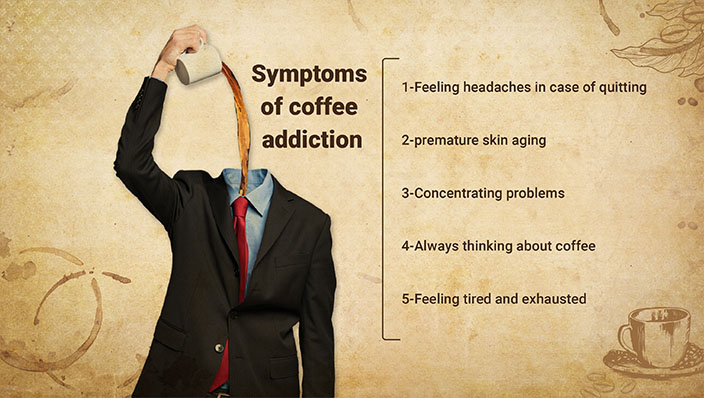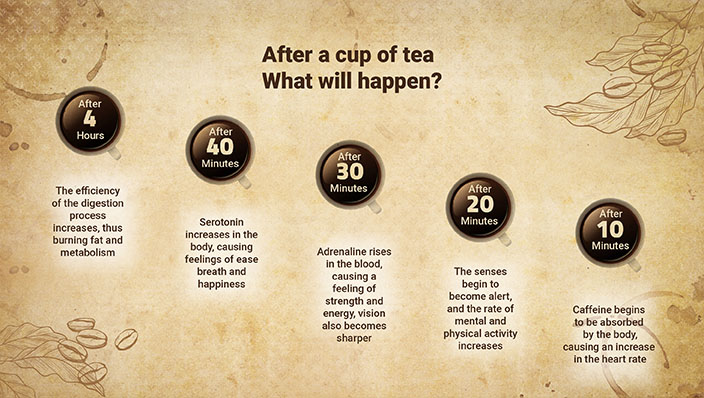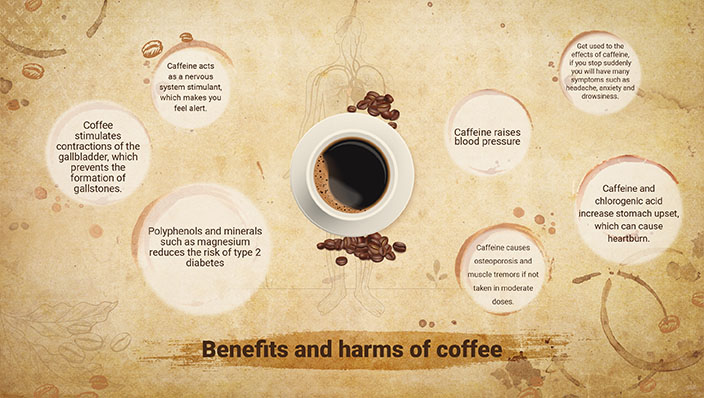the benefits and harms of coffee
A cup of coffee is crucial to many in the morning; as it can provide them the energy needed to start their business, but with frequent coffee consumption, you may turn into a caffeine addict, to find yourself feeling withdrawal symptoms if you stop drinking your coffee for any reason.
How do you know that you are a coffee addict and what are its harms and benefits, this is what you will know. It is detailed with us in the following lines:
- Symptoms of coffee addiction.
- Coffee benefits and harms.
- Black coffee is more harmful.
- Is coffee good for women?
- Conclusion.
Symptoms of coffee addiction

The phenomenon of coffee addiction is not new to our societies, whether Arab or Western, and it is not related to a specific educational or economic level. As it has a charming aroma and wonderful taste, and it is associated in Arab societies with some inherited values such as generosity and hospitality.
But a lot of any drink is not required at all, because of the damage it causes, and it may cause a feeling of addiction symptoms; Especially caffeinated drinks such as coffee, and if you reach the stage of addiction, here are the signs that you are addicted.
1. Feeling a headache
Feeling headaches in case of quitting, which is known as caffeine-withdrawal syndrome, which symptoms begin 12 - 24 hours after the cessation, and the severity of symptoms varies from one person to another.
Doctors explain the severe pain that the person feels in the head that the reason is due to the fact that caffeine causes narrowing of the blood vessels in the head and neck, and in the event of caffeine discontinue, these blood vessels expand suddenly, and thus blood flows in large quantities, which causes head pain or headache.
2. premature skin aging
Coffee compounds work to remove fluid from the body. Over the years, this causes dry skin and the appearance of wrinkles, which leads to early signs of aging.
3.Concentrating problems
Although caffeine often helps focus and improve memory functions, one of the most important problems that result in abstaining from eating it is the activity of adenosine molecules that cause a lack of focus as well as a feeling of tiredness and fatigue.
If you find that you have the symptoms that we mentioned above, you should treat coffee addiction so that these symptoms do not affect your life negatively and cause you trouble.
The good news is that you can quit your coffee addiction without experiencing withdrawal symptoms, by following a gradual reduction regime, decreasing your caffeine intake by 10% every two weeks, which will eventually lead you to reach your goal maybe within several months, but you will eventually reach it.
4. Feeling tired and exhausted
coffee addicts cannot do without it, looking for their drink in the streets to regain their activity, due to their bodies accustoming to caffeine, which in turn affects the secretion of adrenaline, and adrenaline is one of the substances that stimulate and alert the body, which is embodied in the expansion of Air passages to supply the muscles with the necessary oxygen.
The secretion of adrenaline at normal rates is okay, but its continuous and long-term secretion causes fatigue and many other risks.
The benefits of coffee

Studies published by Harvard indicated the role of coffee in reducing the risk of early death in coffee drinkers by 25% compared to those who do not drink coffee, which consists of more than a thousand complex chemicals.
(240 ml) of coffee contains the following proportions of nutrients shown :
|
Vitamin B2 (Riboflavin) |
The shown amount contains 11% of the body's daily needs. |
|
Vitamin B5 (Pantothenic Acid) |
The shown amount contains 6% of the body's daily needs. |
|
Vitamin B1 (Thiamine) |
The amount shown contains 2% of the body's daily needs. |
|
Vitamin B3 (Niacin) |
The amount shown contains 2% of what the body needs daily |
|
Folate |
The amount shown contains 1% of what the body needs daily |
|
Manganese |
The amount shown contains 3% of what the body needs daily |
|
Potassium |
The amount shown contains 3% of what the body needs daily |
|
Magnesium |
The amount shown contains 2% of what the body needs daily |
|
Phosphorous |
1% |
Harms & benefits of coffee
Caffeine is completely safe if you have a moderate amount of it, due to its benefits that have been proven by many studies and research, but its excessive intake poses serious dangers to many parts of the body, we explain this as follows :

|
Coffee benefits |
Coffee harms |
|
|
Nervous system |
Caffeine acts as a nervous system stimulant, which makes you feel alert. Studies have proven that coffee works to reduce Alzheimer's disease. Therefore, many consider coffee as a healthy beverage, as its consumption reduces the risk of depression and suicide. Many also prefer to take it before exercising because it gives the body activity due to the action of adrenaline, which caffeine stimulates its secretion. |
The blood vessels in the brain get used to the effects of caffeine. But if you stop suddenly you will experience many symptoms such as headache, anxiety, and drowsiness. |
|
Digestive system |
Coffee stimulates contractions of the gallbladder, which increases the flow of bile so that cholesterol does not accumulate, which prevents the formation of gallstones. |
Caffeine and chlorogenic acid increase stomach upset, which can cause heartburn. Excess caffeine in the body is not stored but processed through the liver, so you may find you have increased urination shortly after taking caffeine. So if you suffer from stomach problems such as ulcers or GERD; You should ask your doctor if it is OK to take caffeine for you. |
|
Circulatory system |
Polyphenols and minerals such as magnesium improve the effectiveness of insulin metabolism, which reduces the risk of type 2 diabetes in coffee drinkers compared to non-coffee drinkers. Evidence suggests that drinking coffee regularly reduces the risk of heart disease and stroke. |
Within an hour or two of ingesting caffeine, it is absorbed to reach its highest levels in the blood. Caffeine raises blood pressure, and some are due to an increase in the level of adrenaline. If you have an arrhythmia, caffeine can make your heart work too hard, so if you have an irregular heartbeat or high blood pressure, ask your doctor if it's OK for you to drink caffeinated drinks. In rare cases, high caffeine intake can cause heart rhythm disturbances, difficulty breathing, and death. Unfiltered coffee, such as French coffee and Turkish coffee, may cause high levels of triglycerides and cholesterol in the blood. |
|
Skeletal and muscular |
Caffeine causes osteoporosis and muscle tremors if not taken in moderation. |
coffee and cancer
Studies have proven a relationship between coffee consumption and cancer, as coffee stimulates the production of bile acids and speeds up digestion, which reduces the amount of carcinogens to which the colon is exposed.
Coffee has also been associated with lower levels of estrogen, the hormone associated with many types of cancer. Coffee also contains many antioxidants, reduces inflammation, and reduces the risk of cancer of the mouth, throat, pharynx and skin, and research is still ongoing in this regard.
Is coffee good for women?
.jpg)
Despite the benefits proven by the World Health Organization and a number of global studies conducted by Harvard and Oxford on both men and women alike, coffee provides additional benefits for women's health, which we present as follows:
- Coffee makes you smarter: Caffeine blocks hormones that inhibit brain function, and you can focus better at work.
- Coffee increases your lifespan: Coffee can protect you from cancer and many chronic diseases, and there is a lot of proven research on its role in protecting against early death.
- Protect your nervous system: Coffee produces more dopamine, which works to protect you from many diseases such as dementia, Alzheimer's and stroke.
- Helping you lose weight: Caffeine acts as a stimulant to move fat from adipose tissue and increase metabolism. It also helps regulate blood sugar levels and reduce cravings for sugary foods or snacks.
- Maintain your appearance: Coffee reduces the appearance of aging on the skin thanks to the antioxidants it contains.
- Improving athletic performance: Women who drink coffee can exercise better thanks to adrenaline, which stimulates coffee production in the body, which works to reduce fatigue, improve brain function and memory, as well as raise energy levels.
- Treating depression and adjusting mood: Studies have indicated that women who drink coffee are 50% less likely to commit suicide or have suicidal thoughts thanks to stimulating the secretion of mood-enhancing hormones such as serotonin and dopamine.
- Detoxing: Coffee acts as a good diuretic, which means eliminating toxins from the body.
- Get some important nutrients for the body: There are many beneficial nutrients for the body that coffee contains, which you can find in detail at the top of the article.
Coffee and the balance of hormones in the body

Hormonal imbalance, of course, affects many body functions and may make you feel some sick symptoms, and hormonal imbalance may occur due to high or low estrogen, so many studies and research have focused on studying the effect of coffee on estrogen levels inside the body.
According to research by the National Institute of Health, coffee can alter estrogen levels in the blood, but this effect can only be seen with an intake of more than 200-400 milligrams per day.
According to the study, these effects differed from one race to another, as it was found that white women who consumed 200 milligrams or more of caffeine had slightly lower estrogen levels than women who consumed less, while it was found that black women who consumed 200 milligrams or more of caffeine every day they have elevated levels of estrogen.
The study, published in the New York Times, analyzed data from 250 women of childbearing age who consumed about 90 milliliters of caffeine and found that there was no effect of concern, neither on ovulation nor on general health, at least in the short term.
While Dr. Enrique Chesterman reports that drinking coffee for women of childbearing age does not affect their hormonal functions, he points out that there is no proven information about long-term effects for older women.
Here, it is worth noting that it is necessary to consult a doctor about the recommended amount in cases of hormonal disorders in some women, because if they make them more sensitive to caffeine and may exacerbate their symptoms.
With regard to the effect of coffee on pregnancy, little coffee is safe during pregnancy, but excessive consumption may lead to a slowdown in the growth of the fetus and risk of miscarriage, and caffeine increases heart rates and metabolism disorder of the fetus.
Is black coffee more harmful?
Many believe that dark coffee contains higher levels of caffeine than light coffee, but more caffeine is burned with the length of roasting, which makes light coffee contains higher levels of caffeine, but remember that the difference in caffeine percentages is slight because caffeine as a chemical is stable in The coffee bean, while the size and density of the beans are affected in the roasting process, which leads to a slight change in the percentage of caffeine, and so the problem is not in the percentage of caffeine.
Black or dark coffee contains a higher percentage of chlorogenic acid, which causes an increase in acidity in the stomach, which can lead to symptoms of GERD and abdominal cramps and cramps.
Conclusion
- Excessive coffee is not required at all, as it may cause symptoms of addiction.
- Many studies have proven the benefits of coffee, but they have shown many damages that may be caused to the body if large amounts of it are consumed.
- Coffee offers additional benefits for women's health, provided the recommended proportions are adhered to.
- Coffee works to reduce the growth of cancer cells inside the body thanks to its antioxidants.
- Caffeine levels vary depending on the type of coffee, the coffee beans used to prepare it, and a number of other ingredients.

